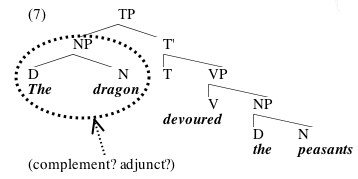
We now have ways of guaranteeing that a head will have all and only the complements that it selects for, and that these complements will be sisters of the head (the projection principle). We can therefore account for facts like the ones below:
(1) The dragon devoured the peasants.
(2)*The dragon devoured.
(3) The dragon rejoiced.
(4)*The dragon rejoiced its victory.
(5) The dragon devoured the peasants quickly.
(6) *The dragon devoured quickly the peasants.
In other words, we can now correctly force verbs to have objects just when they want them, and can require those objects to be closer to the verb than any adjuncts in the VP (such as adverbs like quickly).
So this theory works beautifully for objects (and other kinds of verb complements). But what about subjects? Here we have several problems.
For one thing, it's not clear what subjects are, in our typology of complements and adjuncts. We probably don't want them to be adjuncts--if the dragon in (1-6) above were an adjunct, for example, we'd expect it to behave like an adjunct (freely repeating or not appearing at all, appearing in a variety of places...), which doesn't seem right. But given where we're putting them in our trees, they can't be complements, either; they're not sisters of any kind of head:

Just to have a name for this type of problem, we're going to invent a new term for referring to parts of the tree. We'll call the position the subject is in a specifier. Specifiers will be positions that are required but are not in complement position (that is, not sisters of heads). In fact, we will see that they are always daughters of maximal projections. So in the tree in (7), the subject is the specifier of TP.
Another problem with subjects is that they always seem to be there, at least in a language like English. We've already seen that some verbs require objects, and others don't; the classical terminology for that is that some verbs are transitive, and others are intransitive. But there is no classical terminology for verbs that require, or don't require, subjects; all verbs seem to require subjects. No matter how hard we look, we won't find a verb like the one in (8):
(8) *Schmevoured the peasants.
So objects appear with some verbs but not others, but all verbs have subjects. This subject-object asymmetry isn't reflected in our theory yet.
In fact, not only do all verbs require subjects, but some of the subjects that you see are pretty pitiful ones. Consider these sentences:
(9) It squeezed John.
(10) It seems that John has died.
The two instances of it in these sentences seem to have different properties. The one in (9) actually refers to something; if I rush into the room and say this, you might ask me, "What did? What's 'it'?" In (10), it would be very odd to try to find out what 'it' refers to; "What does?" just isn't a normal kind of reply to (10), no matter how little you care about John.
In fact, it looks like the word it in (10) is just there so that seems will have a subject. This type of meaningless expression goes by several names in the literature; in this class we'll call it an expletive (you also sometimes hear them called pleonastics).
So expletives are there to make sure that the sentence will have a subject; that is, to make sure that TP will have a specifier. In his 1981 book Lectures on Government and Binding, Noam Chomsky formulated the requirement that TP have a specifier as part of the Projection Principle; he restated the Projection Principle as the Extended Projection Principle:
The EPP captures the fact that all clauses must have subjects (for example, that there are no verbs like schmevoured in (8)). It might also help us with a more general problem with subjects; why are they in the specifier of TP, miles away from anything that might be selecting them? That's a problem we'll return to.